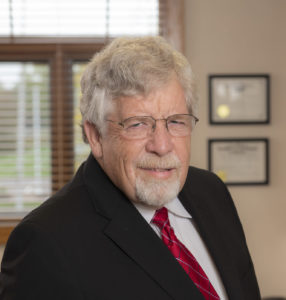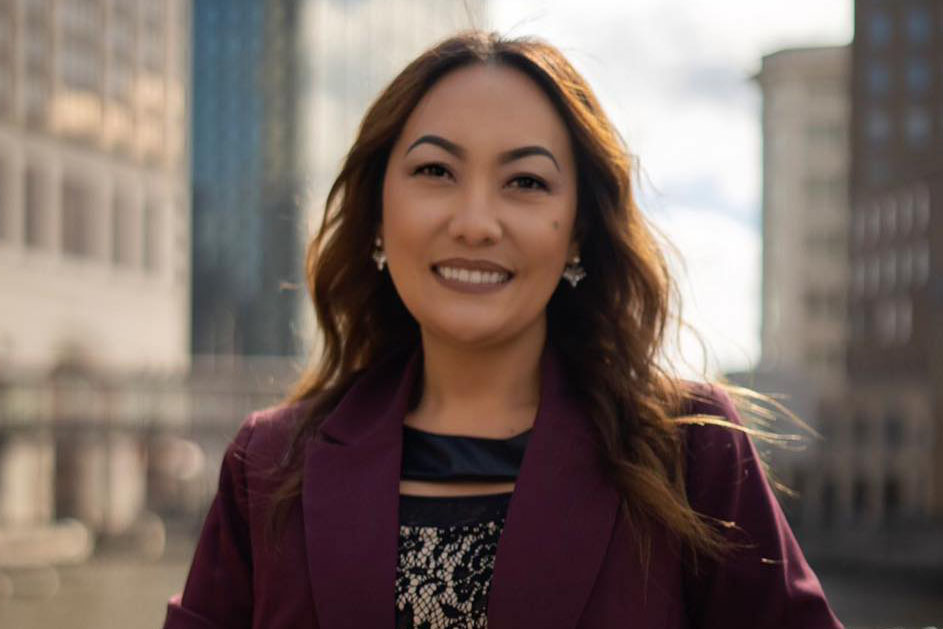Asked & Answered: Dietrich ready to tackle civility and mental health among Wisconsin lawyers
By: Ali Teske//May 11, 2022//
Asked & Answered: Dietrich ready to tackle civility and mental health among Wisconsin lawyers
By: Ali Teske//May 11, 2022//
 Dean Dietrich, the newly elected State Bar president, has more than 40 years of experience in Wisconsin’s legal industry.
Dean Dietrich, the newly elected State Bar president, has more than 40 years of experience in Wisconsin’s legal industry.
He will serve a one-year term as president elect beginning in July 2022 and start his role as president in July 2023. Dietrich, a shareholder at Weld-Riley in Wausau, said he plans to allot his time and attention to a diverse range of matters the State Bar is currently tackling like diversity, as well as matters close to his heart like civility and mental health in the profession.
Dietrich recently sat down with the Wisconsin Law Journal to discuss what he hopes to accomplish as president.
WLJ: Over the last 20 years, 16 of the past presidents have been elected out of Milwaukee and Dane counties. How does it feel to represent a different part of the state on such a high level?
Dietrich: Well, I think that that was somewhat of the intention of the Board of Governors to make sure that the president position is spread across the state. It’s always challenging to get out-state lawyers to participate in the bar and Board of Governors because of travel, but I’ve been very active with the bar for a number of years, and this was a natural next step in my involvement.
WLJ: During your campaign, you highlighted lawyer professionalism and civility along with mental health and wellbeing. Can you elaborate on those?
Dietrich: The legal profession is certainly and probably rightly criticized as one of the more stressful professions and that impacts lawyers, that impacts the services that are provided. I want to pay some attention to that and see if there are things that can be addressed to look at that concept and to remind lawyers that they need to be aware of and pay attention to wellness. The other thing that I have an interest in is the whole area of civility within the legal practice—civility in the courtroom, civility in the board room, civility at the negotiation table. There are a lot of things to be studied about that. Why is there an increase in the lack of civility and are there things that the bar can be doing along with local bars and law schools to heighten the importance of civility and professionalism?
WLJ: May is Mental Health Awareness Month and according to the American Psychological Association, lawyers have the 11th-highest incident of suicide rate among professions and are 3.6 times more likely to suffer from depression and substance abuse. From your experience being in the industry for as long as you have, how has it evolved with the use of technology and wanting lawyers to be available 24/7?
 Dietrich: There are a lot of components to the issue. You identified a large one with technology, which breaks down into a couple different aspects. First of all, virtually everyone today in the legal profession is sitting in front of a screen. That lessens the need for the ability to talk with people and interact, persuade people in a polite way to look at an issue differently. It’s now easier to fire off an email and not really appreciate the tone of the email or see the reaction from somebody you’re talking to about what you may have just said. Technology has made it more challenging for lawyers to maintain that level of civility and professionalism.
Dietrich: There are a lot of components to the issue. You identified a large one with technology, which breaks down into a couple different aspects. First of all, virtually everyone today in the legal profession is sitting in front of a screen. That lessens the need for the ability to talk with people and interact, persuade people in a polite way to look at an issue differently. It’s now easier to fire off an email and not really appreciate the tone of the email or see the reaction from somebody you’re talking to about what you may have just said. Technology has made it more challenging for lawyers to maintain that level of civility and professionalism.
WLJ: And that feeds into the mental health aspect, right?
Dietrich: Availability is another level of concern. It’s not uncommon to be sitting in front of the television with your smartphone in front of you and responding to client communications immediately. There’s a lot of lawyer who have their phones right next to their bed where they sleep and get woken up with texts and things like that. That doesn’t mean you’re not supposed to be responsive to clients, but lawyers need to pay attention to their personal both wellbeing as well as the wellbeing of their clients in responding to their needs and questions. I think technology is ever changing and the reaction we have and how we interact with people is ever changing as we address that. Mental health is very much a challenge. Years and years ago people were comfortable thriving on the stress of the job. I think that’s changed, first of all because the incidents of suicide are at a high level in this profession, but just the need to recognize that you need to find a good work-life balance. I think many lawyers my age weren’t very good at doing that. Many people have learned, but we need to spend more time educating all lawyers about a work-life balance.
WLJ: Tying the two together, do you think the issue of civility starts at the university level having the last few graduating classes really only practice and serve virtually?
Dietrich: I’m reluctant to say that it starts with or is fostered by the experiences of the last several years because the civility and professionalism concerns and observations that I’ve had over the years is that it’s not one age or one generation compared to another that is more guilty of this. It does start with younger lawyers and law schools to help educate them about the importance of civility, professionalism, interaction and the ability to communicate professionally. I’m suggesting that it certainly needs to be a topic that’s addressed in the schooling of lawyers, but it’s not just young lawyers. It’s a complex problem. The duty of zealous representation is an important concept; overusing or overreacting to zealous representation is sometimes what we see. There needs to be consideration of: How do you professionally advocate for your client versus overly aggressively advocating by attacking somebody else, for example? I think the law schools are doing a good job; we just want to make sure that we can help them.
WLJ: Speaking of law schools and new lawyers, there have been other states questioning the requirement of a mandatory bar membership. Wisconsin’s appeals court recently dismissed the lawsuit against the State Bar on the matter. How important do you believe it is for a mandatory state bar and does it benefit the legal community?
Dietrich: The Bar Association, the leadership and the staff at the center work very hard to address the needs of all Wisconsin lawyers and, I think, try very hard to operate as if they were selling themselves all the time to the members of the Bar. Many years ago we talked about this topic and it was shown then that certain programs that benefit the public and benefit various different communities of people would suffer if the State Bar of Wisconsin was not a mandatory bar. It’s a topic of a lot of debate. It’s an important debate. I believe that the value of the Bar and the ability of the Bar to do various programs, services and activities is significantly helped by the fact that it’s a mandatory bar association. You can again have a lot of different debate on the propriety of all the different aspects of it and I respect those who would disagree with some of my beliefs. I really believe that more good is flowing from the mandatory nature of the bar than anything else.
I would add that the State Bar of Wisconsin has a very sophisticated and well-respected procedure to look at whether certain activities of the bar would be deemed political in nature and therefore, not funded by the mandatory dues payment by those attorneys objecting to the use of mandatory dues for political types of purposes. We do a huge job each year of analyzing that.
Legal News
- Wisconsin attorney loses law license, ordered to pay $16K fine
- Former Wisconsin police officer charged with 5 bestiality felony counts
- Judge reject’s Trump’s bid for a new trial in $83.3 million E. Jean Carroll defamation case
- Dozens of deaths reveal risks of injecting sedatives into people restrained by police
- The Latest: Supreme Court arguments conclude in Trump immunity case
- Net neutrality restored as FCC votes to regulate internet providers
- Wisconsin Attorney General asks Congress to expand reproductive health services
- Attorney General Kaul releases update at three-year anniversary of clergy and faith leader abuse initiative
- State Bar leaders remain deeply divided over special purpose trust
- Former Wisconsin college chancellor fired over porn career is fighting to keep his faculty post
- Pecker says he pledged to be Trump campaign’s ‘eyes and ears’ during 2016 race
- A conservative quest to limit diversity programs gains momentum in states
WLJ People
- Power 30 Personal Injury Attorneys – Russell Nicolet
- Power 30 Personal Injury Attorneys – Benjamin Nicolet
- Power 30 Personal Injury Attorneys – Dustin T. Woehl
- Power 30 Personal Injury Attorneys – Katherine Metzger
- Power 30 Personal Injury Attorneys – Joseph Ryan
- Power 30 Personal Injury Attorneys – James M. Ryan
- Power 30 Personal Injury Attorneys – Dana Wachs
- Power 30 Personal Injury Attorneys – Mark L. Thomsen
- Power 30 Personal Injury Attorneys – Matthew Lein
- Power 30 Personal Injury Attorneys – Jeffrey A. Pitman
- Power 30 Personal Injury Attorneys – William Pemberton
- Power 30 Personal Injury Attorneys – Howard S. Sicula











